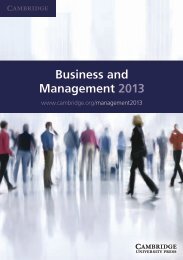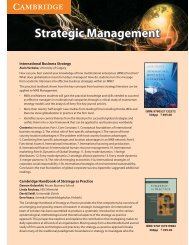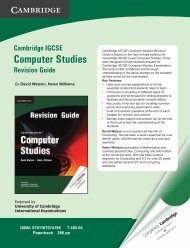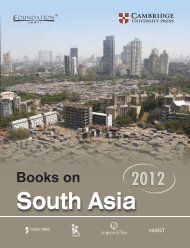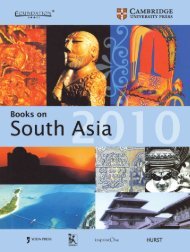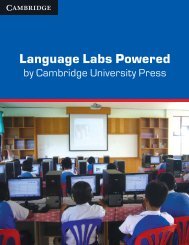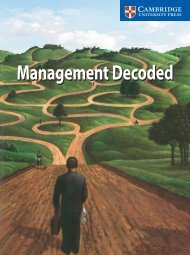India & Cambridge - Cambridge University Press India
India & Cambridge - Cambridge University Press India
India & Cambridge - Cambridge University Press India
- No tags were found...
You also want an ePaper? Increase the reach of your titles
YUMPU automatically turns print PDFs into web optimized ePapers that Google loves.
POLITICSThe Tradition of Non-Useof Nuclear WeaponsT.V. PaulSince the Hiroshima and Nagasakiattacks, no state has unleashednuclear weapons. What explainsthis? According to the author, theanswer lies in a prohibitioninherent in the tradition of nonuse,a time-honored obligationthat has been adhered to by allnuclear states - thanks to aconsensus view that use wouldhave a catastrophic impact on humankind, the environment,and the reputation of the user.The book offers an in-depth analysis of the nuclear policiesof the U.S., Russia, China, the UK, France, <strong>India</strong>, Israel, andPakistan and assesses the contributions of these states tothe rise and persistence of the tradition of nuclear non-use.It examines the influence of the tradition on the behavior ofnuclear and non-nuclear states in crises and wars, andexplores the tradition's implications for nuclear nonproliferationregimes, deterrence theory, and policy. And itconcludes by discussing the future of the tradition in thecurrent global security environment.T. V. Paul is James McGill Professor of InternationalRelations, McGill <strong>University</strong> and Director, <strong>University</strong> ofMontreal-McGill Research Group in International Security.9788175967724 330pp HB ` 795.00Complex Deterrence:Strategy in the Global AgeT. V. Paul,Patrick M. Morgan & James J.Wirtz (eds)Moving beyond the precepts oftraditional deterrence theory, thisground-breaking volume offersinsights for the use of deterrencein the modern world, where policymakers may encounter irrationalactors, failed states, religious zeal,ambiguous power relationships,and other situations where long-established rules ofstatecraft do not apply. A distinguished group ofcontributors here examines issues such as deterrenceamong the great powers; the problems of regional andnonstate actors; and actors armed with chemical, biological,and nuclear weapons. Complex deterrence will be avaluable resource for anyone facing the considerablechallenge of fostering security and peace in the twenty-firstcentury.T. V. Paul is James McGill Professor of InternationalRelations, McGill <strong>University</strong> and Director, <strong>University</strong> ofMontreal-McGill Research Group in International Security.Patrick M. Morgan is Professor of Political Science and theTierney Chair in Peace and Conflict Studies at the <strong>University</strong>of California, Irvine.James J. Wirtz is Dean at the School of InternationalGraduate Studies and Professor of National Security Studiesat the Naval Postgraduate School, Monterey.9788175967816 370pp HB ` 795.00China and <strong>India</strong> in the Ageof GlobalizationShalendra D . SharmaThe rise of China and <strong>India</strong> is thestory of our times. Theunprecedented expansion of theireconomic and power capabilitiesraises profound questions forscholars and policymakers. Whatforces propelled these two Asiangiants into global pacesetters, andwhat does their emergence meanfor the United States and theworld? With intimate detail, Shalendra D. Sharma’s China and<strong>India</strong> in the Age of Globalization explores how the interplayof socio-historical, political, and economic forces hastransformed these once poor agrarian societies intoeconomic powerhouses. Yet, globalization is hardly aseamless process, as the vagaries and uncertainties ofglobalization also present risks and challenges. This bookexamines the challenges both countries face and what eachmust do to strike the balance between reaping theopportunities and mitigating the risks. For the United States,assisting a rising China to become a responsible globalstakeholder and fostering peace and stability in the volatilesubcontinent will be paramount in the coming years.Shalendra D. Sharma is a Professor in the Department ofPolitics at the <strong>University</strong> of San Francisco where he hastaught since 1993.4 maps 26 tables9780521198936 336pp HB ` 895.00Asymmetric Warfare inSouth Asia: The Causesand Consequences of theKargil ConflictPeter R. Lavoy (ed)The 1999 conflict between <strong>India</strong>and Pakistan near the town ofKargil in contested Kashmir wasthe first military clash betweentwo nuclear-armed powers sincethe 1969 Sino-Soviet war. Kargilwas a landmark event not becauseof its duration or casualties, butbecause it contained a very real risk of nuclear escalation.Until the Kargil conflict, academic and policy debates overnuclear deterrence and proliferation occurred largely on thetheoretical level. This deep analysis of the conflict offersscholars and policymakers a rare account of how nucleararmedstates interact during military crisis. Written byanalysts from <strong>India</strong>, Pakistan, and the United States, thisunique book draws extensively on primary sources,including unprecedented access to <strong>India</strong>n, Pakistani, andU.S. government officials and military officers who wereactively involved in the conflict. This is the first rigorous andobjective account of the causes, conduct, and consequencesof the Kargil conflict.Peter R. Lavoy is the Deputy Director of NationalIntelligence for Analysis.6 maps 6 tables9780521193856 426pp HB ` 895.00order online at www.cambridgeindia.org29





